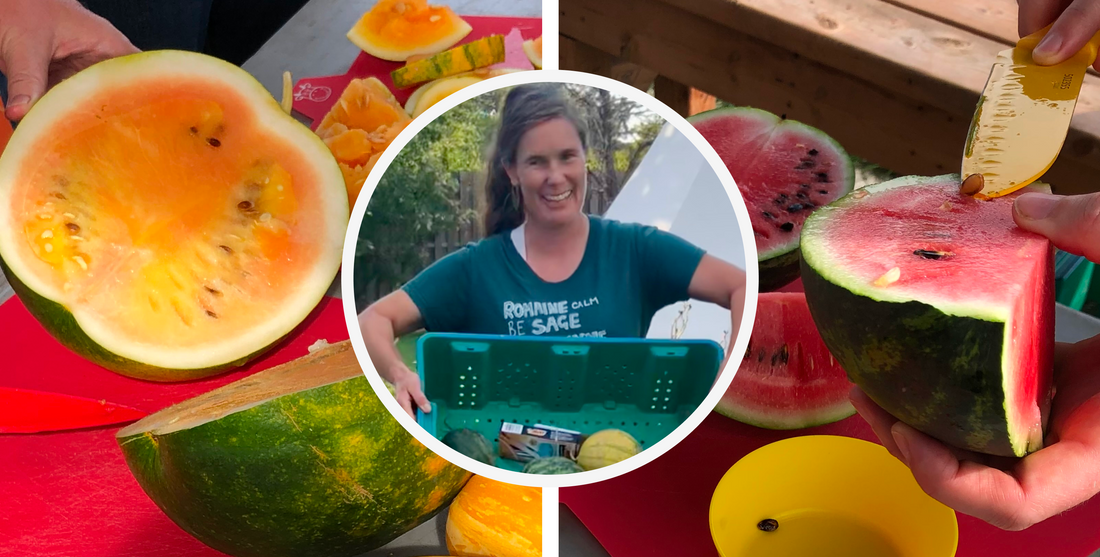By Kay Everts
Evalisa McIllfaterick wanted to grow watermelon, but she faced a challenge. Living in zone 3A just outside of Thunder Bay, Ontario, Canada, she had a mere 90-day growing season with cool evening temperatures. A few years ago, she heard a podcast featuring Joseph Lofthouse discussing landrace gardening and thought, "That makes a lot of sense. Maybe I can adapt watermelon to my environment."
Four other growers joined her three-year watermelon project: two in Thunder Bay, plus Manish in Ottawa and Catherine in Quebec. Manish, curious about watermelon, had a collection of 23 different varieties, including an ancient watermelon he'd interplanted in 2019. The growers agreed to use his seeds to launch the project and save seeds from the first 25 great-tasting ripe melons they harvested.
Evalisa's first year was rough; problems with damping off, ravens, and other animals left her with only eight marginally ripe watermelons. She saved the viable seeds from these eight fruits and, for the second year, mixed them with some of Manish's unused seeds.
Year two proved much more successful, yielding close to 100 ripe fruits and plenty of viable seeds. "The difference between the first year and second year was maybe just as much a reflection of my learning how to grow watermelons as it was of the plants adapting," she said.
The biggest challenge in Thunder Bay was the overnight temperatures. While adequate for ripening watermelons if planted early enough, they weren't high enough to produce good quality seeds. This differed for Manish and Catherine, who enjoyed warmer temperatures in zone 5a.
Evalisa explained the seed quality issue: "When I read John Navazio's book (The Organic Seed Grower), he says to make vigorous, good, high-quality watermelon seed, overnight temperatures shouldn't dip below 21 Celsius (70F), and we're lucky if it doesn't go below 10C (50F) overnight."
In year two, Evalisa observed interesting germination patterns: "All my seed germinated super quick; 98% germination. And then they just sat there with their cotyledons for three and a half weeks before starting to make their first true leaves. I started them indoors under ideal conditions. At all three sites in Thunder Bay, we transplanted our seedlings, using seeds grown in this area the year before, and we finally saw the second true leaf at 6 weeks from sowing. And then they took off."
Manish grew some of Evalisa's seeds alongside his own and found that the ones from Thunder Bay grew and matured faster than his. This early maturation demonstrated adaptation after just a few years.
Now in year three, with support from the Ecological Farmers Association of Ontario (EFAO), she reports their best year for watermelons yet. "We've got some at one of the Thunder Bay farms that are over-ripe, and we are hoping that this will improve the seed vigor. We'll test them next year to see."
With the three-year project complete, Evalisa plans to continue: "I will for sure. I love having these watermelons."
Her final thoughts: "Going To Seed is a really cool project, and I feel very fortunate to be connected. It's really neat what you are doing, and I'm excited to see what comes next. I feel lucky to have been plugged into the seed world."
Author's note: Evalisa's master's thesis revealed an interesting anecdote from the project's third year. When nearly 80% of her extra seeds germinated, she faced a dilemma about what to do with the excess. During a week-long road trip, she brought the seedlings along. "These seeds-becoming-watermelons were not objects; they were subjects of their own lives – lives entangled with my own and to whom I was mutually responsible. We were on this journey together." By the end of her 4,000 km journey, her seeds had found new growers in Manitoba and Saskatchewan with whom to collaborate.
Evalisa is also working on a squash landrace with help from the Going to Seed Farmer Support Program.
